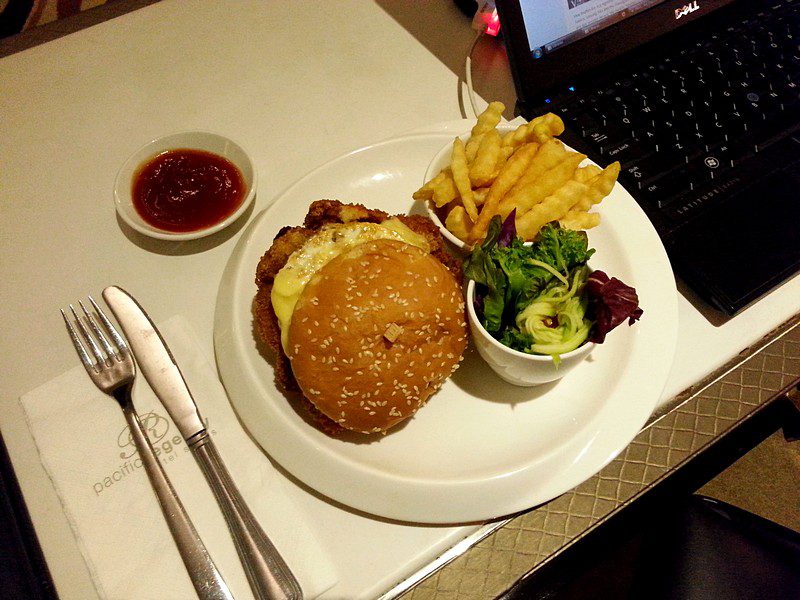In the recent past, hotels offered room service to signify they were a full-service property. Hotel review sites still see 24-hour room service as a requirement to become a 5-star hotel.
But for hotels, room service isn’t something they really like to provide. Room service is often a loss leader for hotels. This means that hotels lose money on each room service order they fulfill, but they hope to make up for it in other areas, such as increased room rates or increased food and beverage sales in the hotel’s restaurants. However, the high cost of labor, food, and delivery has made room service even more unprofitable for hotels in recent years.
A while ago, I saw an article on Conde Nast Traveler’s website that drew my attention: How Grubhub, Uber Eats, and Other Meal-Delivery Apps are Killing Hotel Room Service. This made me think of the all times I’ve ordered room service at a hotel. It was back when I was still traveling with my parents. We usually spent a long day traveling or sightseeing and the last thing we wanted to do was wander around a strange city to find a place to eat. So being comfortable in our room and getting food delivery sounded great.
When I was young, room service entailed pulling out the phone book and looking for a local Chinese restaurant or pizza place. Dinner often looked like this:

We eventually started staying in nicer places, thanks to the Entertainment Book (BTW, it still exists!). Getting room service was a special treat, even if it meant paying $15 for a hamburger, club sandwich or a chicken breast salad, a 15 – 20% service charge on top of that, plus a tip. Well, that was if anyone even picked up the phone when you called and they actually managed to get your order right. It would still be 30-45 minutes before your food arrived, and hopefully wouldn’t include a cold hamburger and melted ice cream.
This is what you imagined you’d receive:

But it usually looked more like this:

Enter post-lockdown 2020. Everyone has created accounts for DoorDash, UberEats, Postmates, Seamless and Grubhub. Now that people have a familiarity with using these services at home, why wouldn’t we expect people to use them when traveling?
Even before 2020, guests were ordering room service less and less. As a result, hotels cut the service from their offered amenities. This quote from the Conde Nast Traveler article sums it up nicely:
But there’s evidence that many travelers really do want to dine in—they just don’t want what hotels have traditionally served, says Heather Geisler, VP of Global Brands and Field Marketing at Hyatt. “What we’ve heard most from our guests is that they simply want more options,” she says, “and the freedom to choose.”
I found another quote from an interview with one of our favorite new hotel brands, Moxy Hotels:
“Our research shows that next-generation travelers prefer self-service over full-service options,” explains Vicki Poulos, global brand director for Moxy Hotels. “They want to feel welcomed but don’t want fussy service during their stay. Those traits have really informed our strategy in building this brand.”
The Moxy Café also takes a cue from another successful chain. “Think of it like Pret a Manger, where you walk around to refrigeration cases with vertical displays, help yourself, and check out at the end,” says Wolfgang Lindlbauer, chief discipline leader, global operations, Marriott International. “It’s cool and contemporary.”
Hey, if all hotels are gonna make hotel food like Pret a Manger, Sharon and I are in. Not all hotels want to do this, but many are starting to embrace modern trends to make their guests happy.
Due to the change in dining habits, more restaurants have started to offer delivery and take-out services. They’re even allowed to offer alcohol deliveries. So if we were at a hotel and didn’t want to go out to find somewhere to eat, I’d definitely pull out my phone and look for a delivery option before I’d pick up their phone to order room service.
When it comes to 24-hour room service, I can never think of the time I wanted food delivered at 4 AM, but Your Mileage May Vary and if so, your life is much more interesting than Sharon’s and mine.
Final Thoughts
Overall, the decline in room service in hotels is a sign of the changing times. Guests are demanding more convenience, flexibility, and value for their money. As a result, hotels are rethinking their offerings and focusing on providing experiences that meet the needs of today’s travelers.
Want to comment on this post? Great! Read this first to help ensure it gets approved.
Want to sponsor a post, write something for Your Mileage May Vary, or put ads on our site? Click here for more info.
Like this post? Please share it! We have plenty more just like it and would love it if you decided to hang around and sign up to get emailed notifications of when we post.
Whether you’ve read our articles before or this is the first time you’re stopping by, we’re really glad you’re here and hope you come back to visit again!
This post first appeared on Your Mileage May Vary

5 comments
I generally like room service. The selection obviously isn’t as broad as Grubhub, but there’s a lot to like by comparison IMO.
Your food has a shorter distance to travel, so it tends to be fresher and is more likely to be hot because it’s often quicker.
Lots of areas I’ve stayed in simply don’t have an independent delivery service.
If room service makes a mistake or forgets something, recovery is normally much faster.
You don’t have to meet the room service person in the lobby.
There’s more accountability with room service, since you’re already staying at the hotel. Marching up to the front desk at the time or later becomes a consideration if they’re serving a subpar product, so I think they try harder.
Room service will bring you ice if requested.
Food delivery services depend on variable hours of the restaurants they use; I prefer consistent hours over scanning to see what’s open at the time.
No lost drivers. Yes I’ve heard of Apple Maps but I still know people who’ve hit problems getting food deliveries.
I realize that circumstances will alter someone’s perspective a lot. I stay in hotels, however small at times, where some people stay at Airbnb’s. Obviously an Airbnb would preclude room service. Some people don’t ever eat late, only want to order from a familiar chain, or have some idiosyncrasy that keeps them from using one service or the other. For myself, I find room service to be preferable. I mention this as a respectful counterpoint, not as an argument BTW.
I just stayed in a luxury Stockholm hotel and the breakfast was delivered free of charge to our bed, promise you it was better and nicer than comingling with the crowd at a buffet or having stale crap with lukewarm coffee from a delivery service (if even open and delivering and not taking one hour to arrive to the hotel)…
For most of my travels, room service is an essential requirement. As someone who travels solo a lot, I prefer (and enjoy) eating in my room rather than sitting alone in a restaurant waiting for my food. I simply avoid hotels without room service.
I had room service once, never again. All the bs extra fees and then a tip for going in an elevator to deliver my food? I’ll walk the 5-10 minutes to a nearby restaurant and order there. Cheaper and better quality.
How can they lose money when they charge a high fee for the food, then a ridiculous service fee for each person and a delivery fee and then a tip? I $20 meal ends up costing $50. Not buying the fact that they lose money on room service.